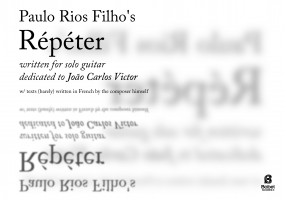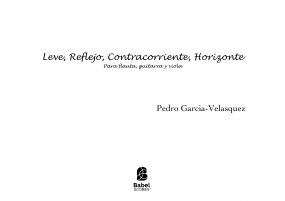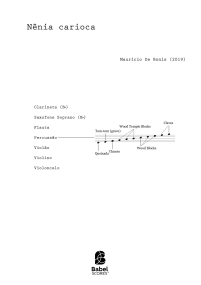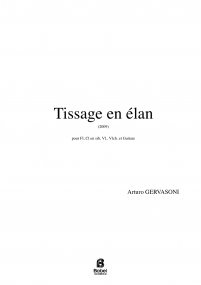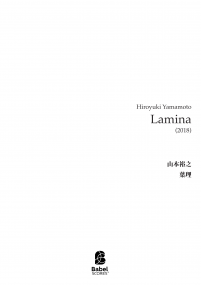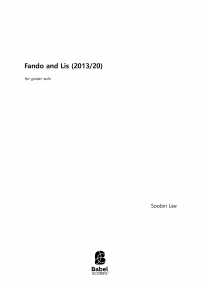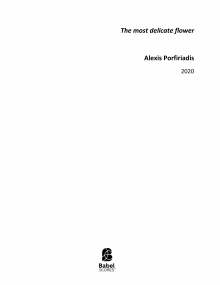Tempo Mental Rap
ISMN : 979-0-2325-3020-8
- Identifiez-vous pour créer une liste
Tempo Mental Rap, written for Stefan Östersjö is a composition for solo guitar that consists of a series of 6 variations based upon a rap (spoken phrases) performed by Frank Zappa that was transcribed by the guitarist Steve Vai.
Winner of the Kompositionspreis der Landeshauptstadt Stuttgart 2007.
WHAT OTHERS SAY
“Search for new styles of expression”
“The Swedish guitarist Stefan Östersjö performed the Tempo Mental Rap of the prizewinner Michael Edgerton, a highly virtuosic work. The well-known expressive possibilities and techniques of this instrument were blown up and thus new sound possibilities were developed. Hans-Peter Jahn, director of new music at SWR, had personally assisted Mr. Östersjö in performance by turning pages of the oversized musical score. The intrinsic rhythmic speech-song (of the Frank Zappa rap) remained exciting with both hands gripping, knocking, hitting and stroking until the conclusion.”
Hans-Jörg Lund. Reutlinger General-Anzeiger 29.04.08
RE: Tempo Mental Rap – Prize-winning concert of the Kompositionspreis der Landeshauptstadt Stuttgart 2007, April 25, 2008.
“Eloquent gestures full of tension”
“The guitarist Stefan Östersjö whistled along the strings, whispered fleeting noise-clusters and coaxed long drawn out tones from his instrument, sometimes similar to improvised, hectic gestures at dangerously fast speeds.
The “Tempo Mental Rap” was seen to be a ghostly or disembodied piece, in which conventional musical expressions were thrown out, … Throughout the piece, innovative extensions involving sound production .. hinted at an otherworldly expression.”
Ulrich Köppen, Stuttgarter Nachtrichten 28.04.08
“Edgerton’s piece is one of the most ambitious and wide-ranging solo guitar works in the contemporary literature. The work features quite an unusual expressive range and a great variety of technical means, that include not only traditional performance techniques, such as rasgueado and strumming techniques and tapping, but also using other means to produce sustained source characteristics, such as using metal, wooden and glass objects, small fans and dishwashing pads on the strings. … Edgerton takes a Frank Zappa transcription by Steve Vai as material for variations where the outer boundaries of guitar playing are questioned and re-considered. … Edgerton’s work is truly one of the most significant and explorative works to have ever been written for the acoustic guitar. It also gives an idea of how the complexity in procedures of compositional work within modernism can be brought in dialectic relations to a great variety of different modes of expression in contemporary music on the one hand and recent research in different disciplines on the other. In addition, the Tempo Mental Rap gives a strong idea of how strategies and instrumental approaches from experimental free improvisation can be brought into play in structured composition.”
Stefan Östersjö, DIRECTOR ENSEMBLE ARS NOVA
“… Edgerton looked after performance practice and tradition of the string quartet, with only a few pauses were intricate figurations with new means of articulation reorganized – such as finely differentiated rules for bow angle and the intensity of the finger pressure. After the first movement I was curious to see how Edgerton applies the findings of his research when referencing Giacinto Scelsi (third movement) and Helmut Lachenmann (fifth Movement). ” (translated by M. Edgerton)
SÜDWESTPRESSE ROTTENBURGER POST, 6 APRIL 2004
Pages - 82



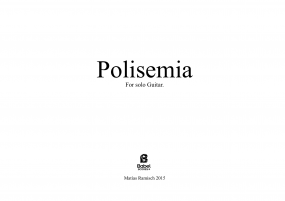
![Co[l]oto[mi]c[nal] image](/images/stories/virtuemart/product/resized/portada_7018.230308.213818_colotomicnal.png)
